Sorted by date Results 26 - 50 of 353

On January 9, 1916, one of World War I's most grueling and consequential campaigns came to a close. After nearly eleven months of fighting, the final Allied troops withdrew from the Gallipoli Peninsula, marking a decisive victory for the Ottoman Empire and ending one of the war's most ambitious but ill‑fated operations. A Campaign Born of Strategic Ambition The Gallipoli campaign began in early 1915 as a bold Allied attempt to break the stalemate of the Western Front by opening a new theater o...

On the final night of the year 406, as the Roman world prepared to welcome a new year under the consulship of Arcadius and Probus, one of the most consequential border breaches in European history unfolded. Along the frozen or weakened stretches of the Rhine River - Rome's most secure frontier in the northwest - a coalition of Vandals, Alans, and Suebians crossed into Roman Gaul. Ancient chronicler Prosper of Aquitaine recorded the moment with stark clarity: "Vandals and Alans came into the Gaul...
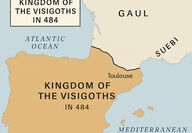
On December 28, 484, a young nobleman named Alaric II ascended the throne of the Visigoths, inheriting a kingdom that stretched across much of southern Gaul and the Iberian Peninsula. His rise marked a pivotal moment in the post‑Roman West - a world still reeling from the collapse of imperial authority, where new kingdoms were carving identities out of the ruins of empire. A Kingdom in Transition Alaric II succeeded his father, King Euric, one of the most powerful and assertive Visigothic rulers...
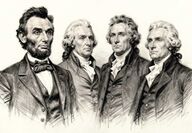
“The contest is really for empire on the side of the North, and for independence on that of the South, and in this respect we recognize an exact analogy between the North and the Government of George III, and the South and the Thirteen Revolted Provinces. These opinions may be wrong but they are the general opinions of the English nation.” London Times, November 7, 1861 The modern world reflects how Lincoln’s consolidation of power has produced the fruits of empire identified in the 1861 Londo...
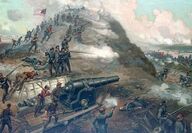
On January 15, 1865, as the American Civil War entered its final, grinding months, Union forces achieved one of the most strategically decisive victories of the entire conflict. Fort Fisher-an enormous sand‑and‑earth stronghold guarding the approaches to Wilmington, North Carolina-fell after a massive joint Army‑Navy assault. With its capture, the Union effectively sealed off the last major seaport available to the Confederacy, choking off the final artery through which supplies could reach...

On January 12, 1539, two of Europe's most powerful rulers-King Francis I of France and Holy Roman Emperor Charles V-signed the Treaty of Toledo, a diplomatic accord intended to stabilize a continent exhausted by decades of rivalry, shifting alliances, and intermittent war. Though often overshadowed by the more dramatic battles of the Italian Wars, the treaty marked a pivotal moment in the long struggle between the Valois and Habsburg dynasties for dominance in Western Europe. A Rivalry That...
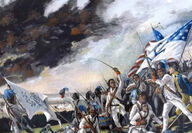
In 1776 - 250 years ago - General George Washington made a decision that was both pragmatic and radical for its time when he integrated the Continental Army, allowing free Black men and later some formerly enslaved men to serve alongside white soldiers. But rather than being driven by enlightened ideas or progressive principles, Washington's command decision reflected practical military necessity, political calculation, and an evolving understanding of liberty. Before the Revolution, Black milit...

On January 20, 1991, Sudan's military‑Islamist government intensified its transformation of the country by imposing Islamic law nationwide, a move that dramatically worsened the already‑devastating civil war between the Muslim‑majority north and the largely Christian and animist south. The decision marked a turning point in Sudan's modern history, hardening political divisions, escalating violence, and deepening the authoritarian grip of President Omar al‑Bashir's regime. The imposition of Shar...

On a frigid Sunday morning in St. Petersburg, January 22, 1905, tens of thousands of Russian workers and their families set out on what they believed would be a peaceful march toward the Winter Palace. Led by the charismatic Orthodox priest Father Georgy Gapon, the demonstrators carried religious icons, portraits of Tsar Nicholas II, and a petition pleading for basic reforms: fairer wages, safer working conditions, shorter hours, and a representative national assembly. Their hope was simple and...

On January 23, 1570, Scotland witnessed a turning point in both its political turmoil and the history of violence. James Stewart, 1st Earl of Moray, the regent governing on behalf of the infant King James VI, was assassinated in the town of Linlithgow-an act that became the first documented political killing carried out with a firearm. A Nation in Upheaval The Earl of Moray had risen to power during one of Scotland's most volatile eras. Following the forced abdication of Mary, Queen of Scots, Mo...

On January 24, 2020, China entered one of the most dramatic public‑health responses in modern history. What began as a cluster of unexplained pneumonia cases in Wuhan rapidly escalated into a national emergency, culminating in the lockdown of 15 cities across Hubei Province. The decision, unprecedented in scale and speed, marked a turning point in the global understanding of COVID‑19 and signaled that the world was facing a crisis unlike anything seen in generations. A Province Sealed Off By...

On January 25, 1533, in a quiet ceremony far removed from the splendor and spectacle normally associated with English royalty, King Henry VIII secretly married Anne Boleyn. The event, conducted in utmost secrecy at Whitehall Palace, marked a turning point not only in Henry's personal life but in the political and religious trajectory of England itself. What began as a private union would soon ignite a revolution that reshaped the nation's identity, its church, and its monarchy. The clandestine...

On December 26, 1944, amid the bitter cold and chaos of the Ardennes Forest, General George S. Patton's Third Army achieved one of the most celebrated feats of World War II: the relief of Bastogne. After days of relentless German assault, the encircled U.S. 101st Airborne Division and other units holding the Belgian town were finally reached by American armor, ending a siege that had become a symbol of Allied grit and defiance. The breakthrough marked a critical turning point in the Battle of...

December 20, 1989 - In the early hours of December 20, 1989, the United States launched Operation Just Cause, a large‑scale military invasion of Panama aimed at removing strongman Manuel Noriega from power and restoring the country's elected government. The operation would become one of the most significant U.S. military actions of the late Cold War - and the first to feature the combat use of purpose‑built stealth aircraft. More than 27,000 U.S. troops participated in the invasion, str...

Imagine going to visit a relative in another country and discovering they had things that your own country did not. Not only were goods available for sale, but varieties of food were offered at fair and reasonable prices. People seemed happier in their jobs, and there was a certain vibrancy throughout all strata of society as they enjoyed more autonomy and freedom of movement. Government was less intrusive and more in the background. Law enforcement was more partner than adversary. Imagine furth...
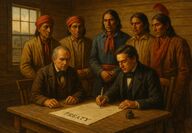
December 29, 1835 - New Echota, Georgia - On a cold December day in 1835, in the Cherokee capital of New Echota, a small group of Cherokee men signed a document that would alter the fate of their nation forever. Known as the Treaty of New Echota, the agreement ceded all Cherokee lands east of the Mississippi River to the United States, setting the legal foundation for the forced removal that would later be remembered as the Trail of Tears. Though signed by only a minority faction of the...

Inside Air Force One: The history of America’s most famous non-commercial jet The U.S. leads the world in private aviation, with the largest and fastest-growing market, projected to reach $40.05 billion by 2029. With that in mind, it’s no surprise that Air Force One, America’s most famous non-commercial jet, ranks among the most advanced and secure non-combat aircraft ever built. While one might assume that America’s fascination with private aviation began with the presidential plane, history...
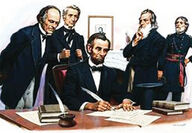
Crossing the Rubicon, a common phrase used to describe a point of no return, is typically traced back to Julius Caesar’s crossing of the river Rubicon in January 49 BC, initiating the Roman Civil War. An analogy can be drawn between the actions of Caesar and those of Lincoln in his call for 75,000 “volunteers” from each State to invade the seven States that voted to secede from what they understood to be a voluntary union. After Lincoln resupplied Fort Sumter (an act of war), he got the antic...

The fifty-third Annual Thanksgiving Pow Wow held by the Poarch Creek Indians is scheduled this year for Thursday and Friday (November 27th and 28th, 2025). And ahead of their famous Annual Thanksgiving Day Pow Wow, Alabama Public Television is airing the Emmy Award winning documentary about the Poarch Creek Indians entitled, "The Forgotten Creeks". Produced by Jacksonville State University's Longleaf Studios with Seth Johnson as the executive producer, the documentary is just shy of an hour in...
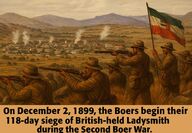
On December 2, 1899, the dusty hills of Natal, South Africa, echoed with the thunder of Boer artillery as the 118-day Siege of Ladysmith began-a pivotal moment in the Second Boer War that would test the endurance of British troops and reshape imperial strategy. The Backdrop: Empire, Gold, and Resistance The Second Boer War (1899–1902) was not just a colonial skirmish-it was a clash of empires and ideals. The British Empire, seeking to consolidate control over South Africa's gold-rich t...
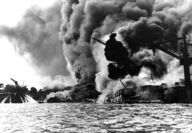
On December 7, 2025, Americans across the country pause to honor the 84th anniversary of the attack on Pearl Harbor-a day that forever altered the course of history and galvanized a nation into action. Known as National Pearl Harbor Remembrance Day, this solemn occasion commemorates the 2,403 American lives lost in the surprise military strike by the Empire of Japan on the U.S. naval base at Pearl Harbor, Hawaii, in 1941. A Day That Lives in Infamy At 7:55 a.m. on that fateful Sunday morning,...

December 8, 1991, BELARUS - Russian President Boris Yeltsin, Ukrainian President Leonid Kravchuk, and Belarusian Parliament Chairman Stanislav Shushkevich met in a secluded government dacha in the Belovezh Forest of Belarus. The meeting was initially shrouded in secrecy, but its outcome would reverberate across the globe. The three leaders signed what became known as the Belovezha Accords, a treaty that declared the USSR had ceased to exist as a subject of international law and geopolitical...

By mid-1775, tensions in Virginia mirrored those in Massachusetts. Royal Governor John Murray, Earl of Dunmore, attempted to suppress rebellion by seizing gunpowder stores and raising forces loyal to the Crown. Among his recruits were Loyalist militias and the controversial Ethiopian Regiment, composed of enslaved people promised freedom for military service. The strategic focus soon shifted to Norfolk, a Loyalist stronghold. The only reliable land approach to Norfolk was across the Great Bridge...

On December 10, 1941, the Royal Navy suffered one of its most devastating losses of World War II when HMS Prince of Wales and HMS Repulse were sunk by Japanese torpedo bombers off the coast of Malaya. This marked the first time in history that capital ships were destroyed solely by air power while at sea, signaling the end of the battleship era. Background: Britain's Far Eastern Gamble - In late 1941, Japan launched a sweeping offensive across Southeast Asia, seeking control of vital resources...

On December 11, 1972, Apollo 17 became the sixth and final mission of NASA's Apollo program to successfully land astronauts on the Moon. This historic event marked the culmination of a bold era in space exploration and the end of the United States' manned lunar landings. Commanded by Eugene Cernan, with Lunar Module Pilot Harrison Schmitt and Command Module Pilot Ronald Evans, Apollo 17 was notable for several reasons. It was the first mission to include a professional scientist-Schmitt, a geolo...